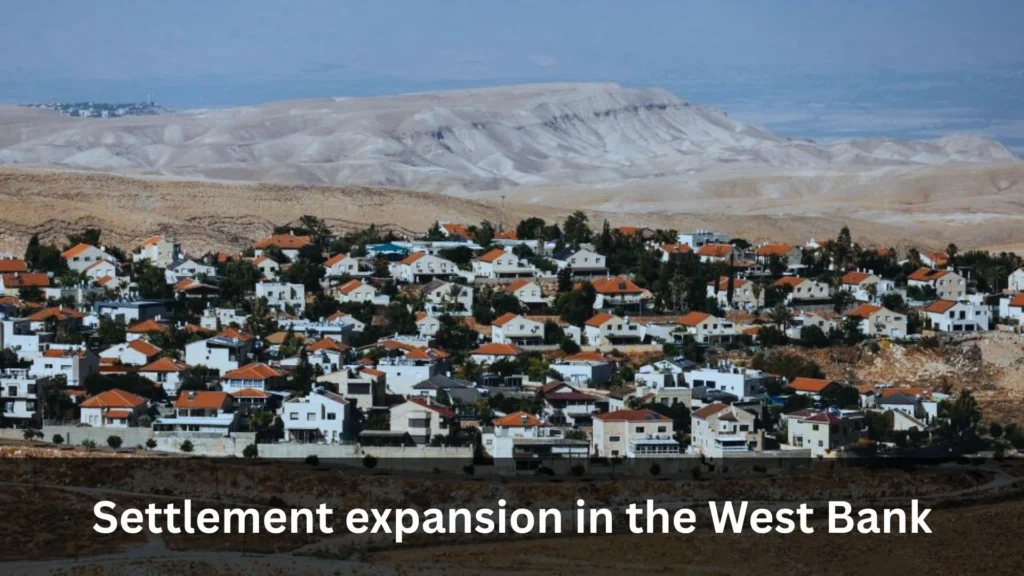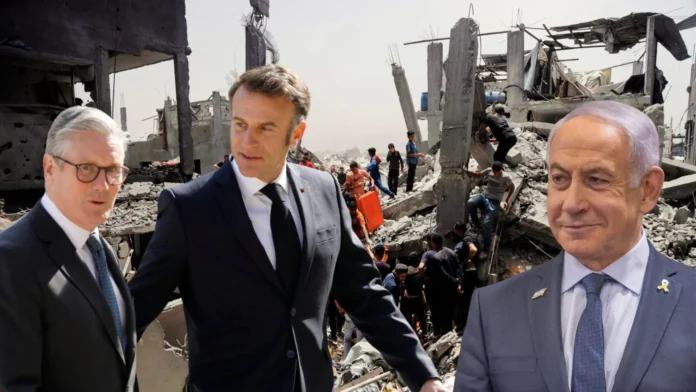Key Takeaways
- Israel Faces Sanctions Threat from Canada, UK, and France in response to its continued military escalation and humanitarian blockade in Gaza.
- The leaders of the three countries criticized Israel’s actions as “egregious” and “disproportionate,” signaling a shift in diplomatic tone.
- A joint statement condemned settlement expansions in the West Bank, calling them illegal under international law.
- The humanitarian crisis in Gaza is worsening, with limited aid access and looming famine, prompting global outcry.
- Foreign ministers from multiple countries are urging the full resumption of humanitarian aid and unrestricted access for relief organizations.
A Diplomatic Turning Point: Western Allies Warn Israel Over Gaza War Actions
In a powerful joint statement released Monday, the leaders of Canada, the United Kingdom, and France warned Israel of sanctions if it fails to halt its renewed military operations in Gaza and lift restrictions on humanitarian aid. The strongly worded declaration marks a dramatic escalation in the West’s response to Israel’s ongoing campaign, which many critics argue has crossed the line of proportionality.
This coordinated message signals a clear diplomatic warning: continued escalation without consideration for humanitarian consequences may come at a political and economic cost.
Mounting Global Concern Over Gaza’s Humanitarian Crisis
The situation in Gaza has become increasingly dire. While Israel announced over the weekend that it would allow a minimal quantity of food into the region, the leaders of Canada, the UK, and France jointly called this move “wholly inadequate.” The statement emphasized that “the level of human suffering is intolerable,” pointing to the worsening food insecurity and the looming threat of famine.
Last week, food security experts and humanitarian agencies raised red flags over the risk of famine due to the severe blockade, particularly affecting vulnerable populations like children and the elderly.
Five relief trucks bringing necessities like baby formula were cautiously welcomed by the UN, which emphasized the urgent need for much more aid.
Escalation in Gaza: What Prompted the Statement?
Israel started a new round of air and ground attacks on Gaza over the weekend, focusing on Khan Younis, the territory’s second-largest city. Israel’s government has framed the offensive as a strategic move to pressure Hamas into releasing hostages taken during the October 7, 2023, attacks.
Human rights organizations and Palestinian leaders promptly denounced Prime Minister Benjamin Netanyahu‘s latest claims that Israel intends to “take control of all of Gaza” and is thinking of programs to promote the “voluntary emigration” of Palestinians.
The joint statement characterized Israel’s military escalation as “disproportionate,” despite reiterating that the three nations uphold Israel’s right to defend itself against terrorism.
Settlement Expansion in the West Bank: A Red Line
The Western leaders didn’t stop at Gaza. Their statement also denounced recent settlement expansion in the West Bank, calling it illegal under international law and “damaging to the viability of a two-state solution.”
The statement emphasized that Israel needed to halt settlement activities, describing them as illegal and detrimental to the security of both Israelis and Palestinians. It also warned that the involved nations would not hesitate to implement further measures, including the possibility of targeted sanctions.
This represents a notable shift in rhetoric from long-standing allies of Israel and indicates a growing discomfort with the Netanyahu government’s broader strategy, not just in Gaza but across occupied Palestinian territories.

Growing International Consensus for Immediate Humanitarian Access
On Monday, foreign ministers from the three nations—alongside officials from other allied countries—issued a complementary statement demanding that Israel allow immediate and unrestricted humanitarian aid into Gaza. They stressed that aid organizations and the United Nations must be permitted to work independently and impartially to address the unfolding crisis.
Their unified voice reflects a broader concern in the international community about the integrity of international humanitarian law and the treatment of civilian populations in conflict zones.
Is the International Community Reaching a Breaking Point?
This joint warning from Canada, the UK, and France represents more than mere diplomacy. It is a clear indication that global patience is running low.
While Israel has long counted on the diplomatic and strategic support of Western allies, continued military action—particularly against the backdrop of increasing civilian casualties and deepening humanitarian woes—has prompted calls for a reassessment of that relationship.
Analysts believe that the threat of sanctions, while still largely symbolic at this stage, could become real if Israel ignores the international plea. The implementation of such measures, even if targeted, would mark a rare and consequential shift in policy among Israel’s closest allies.
What Comes Next: The Stakes for Israel and the Region
If Israel proceeds with plans to “take full control of Gaza,” it risks further alienation from key Western partners. Moreover, policies that promote the emigration of Palestinians evoke dark historical parallels and are likely to spark not just diplomatic but public backlash across Europe and North America.
The erosion of international rules is the larger issue. It is yet unclear whether Israel will heed the warnings or if this will be a turning point in geopolitical history as international powers threaten sanctions and humanitarian organizations raise the alarm.
Conclusion
In a world already marred by conflict and humanitarian crises, the escalating situation in Gaza stands as a test for international diplomacy, morality, and law. As Canada, the UK, and France issue a stern warning to Israel, they do more than criticize—they challenge the world to reconsider the limits of state sovereignty in times of war. The coming days will determine whether Israel adjusts its course or risks a rift with its allies—and with it, a potential shift in the global balance of support in the region.


